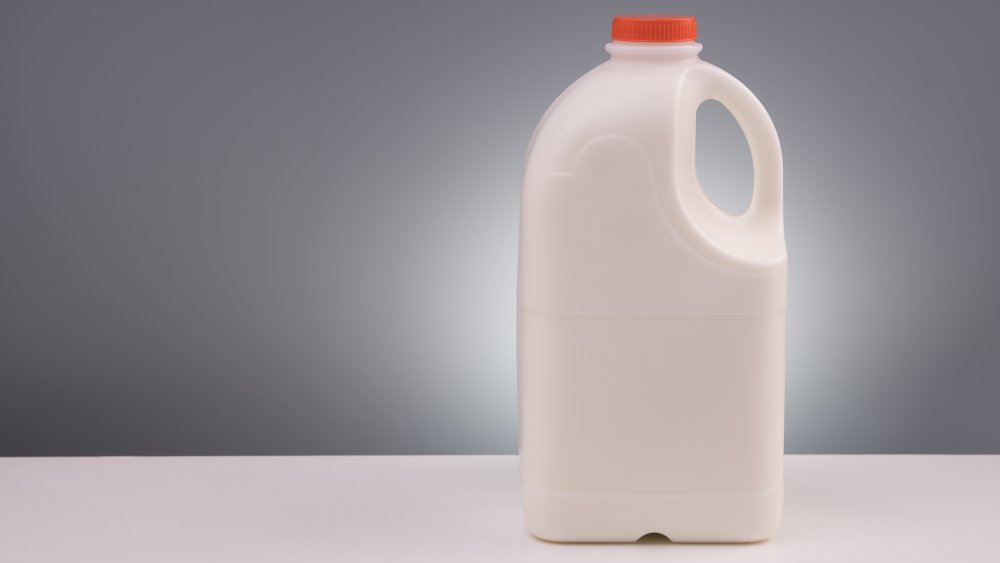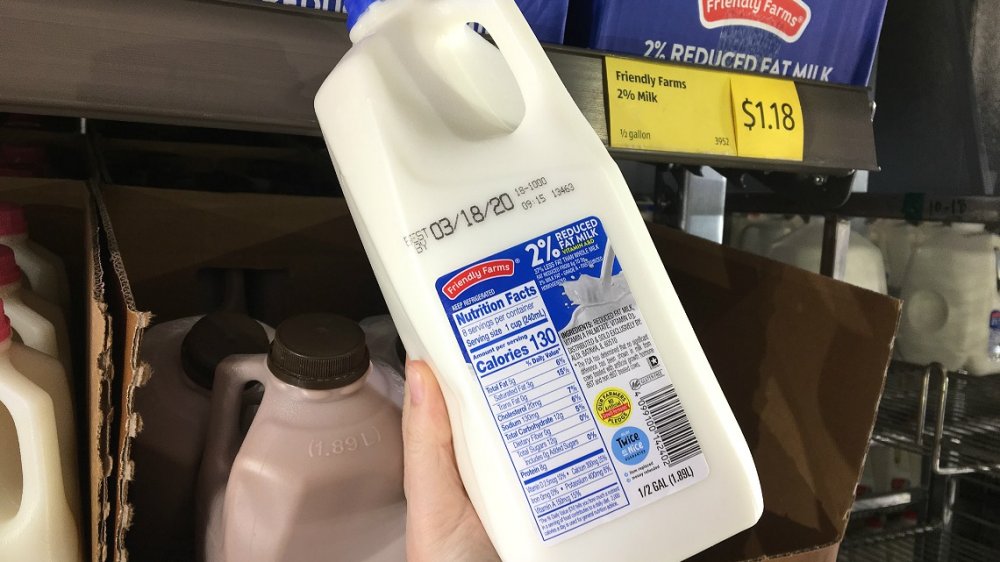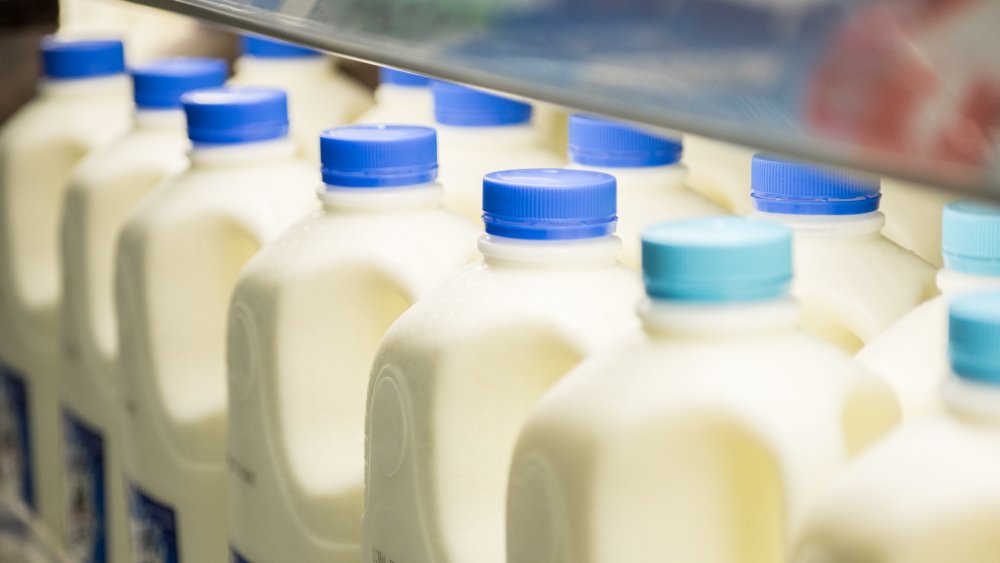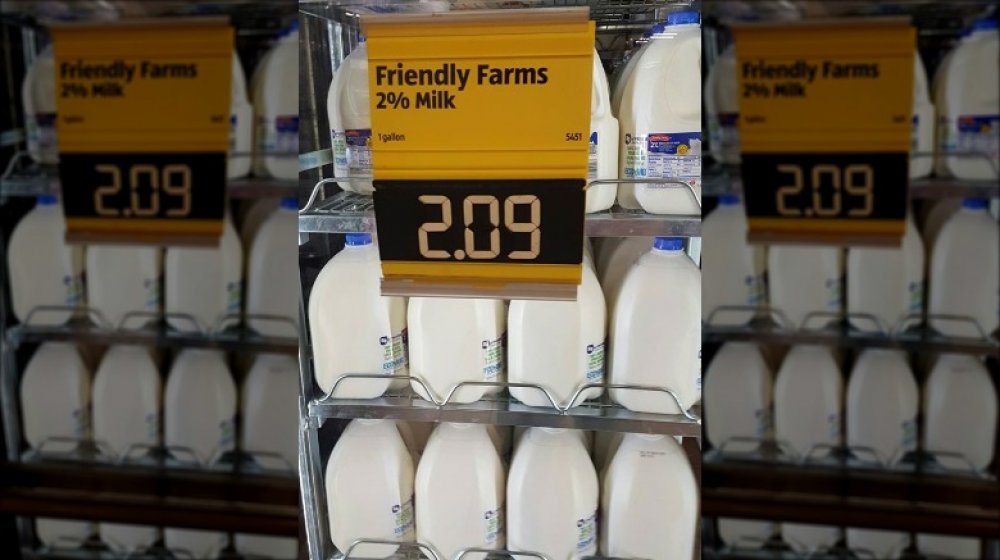This Is Why Aldi's Milk Is So Cheap
While you may at first be drawn to budget grocer Aldi by the lure of their specialty products or weekly finds, you'll find yourself staying for the basics, since their product prices tend to undercut just about any other grocery chain. One of these staple items is milk — although Almost All Aldi did find, in a May 2019 price check, that the Aldi price on a gallon of whole milk beat out Walmart's by just a single cent.
How can Aldi keep its price on milk so low? In part, that has to do with Aldi's overall shoestring operating costs. Smaller stores, shorter opening hours, limited product selection and, of course, those rent-a-carts and that BYO bag policy help keep all of Aldi's prices down, as does the fact that over 90 percent of the items they offer are store-branded so they can cut out all of the middlemen from their supply chain. Taste of Home also reveals that the milk Aldi purchases from its supplier comes in racks so all the workers need do is transfer these milk racks directly into the cooling case — no need to unload each individual carton. Less labor equals lower labor costs, after all, which is kind of the Aldi way — same thinking behind the cart policy, as there is no employee labor required to round these up from the parking lot (or if there is, at least they get to keep your quarter).
Aldi's milk comes without the brand-name label
James' Ordinary Guy Reviews undertook an investigation a few years back to see just why Aldi's milk is so much cheaper than milk sold by most other grocers. James first eliminated any suspicion that Aldi's milk is some kind of lower-grade product — it seems there is such a thing as "B"-grade milk, but it is only sold for use in cheese and other dairy products, not for drinking. Nor do Aldi's milk jugs hold less liquid than the competition's, and their milk is not sold past its expiration date. He also investigated the label and found that milk from Friendly Farms (Aldi's brand) comes from cows who have not been treated with hormones, nor does the milk contain any casein, caseinate, vegetable oil, or other products you would not expect to find in milk. Friendly Farms milk has also been given the REAL® Seal, meaning that it was produced on a U.S. dairy farm (not imported from China, assuming that would even be cheaper) and is made from 100 percent cow's milk.
Eventually, James found a website called Where Is My Milk From? and, inputting the dairy code from his Aldi milk, found that it came from the same plant that sourced milk bearing the Kemp's label. So Aldi's milk product is basically a generic-label version of the exact same stuff that is sold at a higher price under a brand-name label. What a shock — brand names mean higher prices.
Milk prices are down all over
Sadly, there's another reason why the milk at Aldi will not cost you an arm and a leg, or even a finger and a toe: the dairy industry seems to be in a state of crisis everywhere. In the U.S., the prices dairy farmers are paid for the milk they produce are at their lowest (adjusted for inflation) in half a century, and the Milwaukee Journal Sentinel reports that the 21st century has so far seen over 75 percent of smaller U.S. dairy farms go out of business.
In the UK, Aldi was one of the retailers linked to "farm gate" price cuts forced on British dairy farmers, who then called for a boycott of Aldi and the other grocers in 2012 (via The Guardian). It took another three years before Aldi responded by raising the prices they paid for UK milk from 25p per liter to 28p, a move hailed as progress by the Farmers Guardian but still lower than the 30p per gallon that dairy farmers received prior to 2012's price cuts.
Should you skip buying Aldi's cheaper milk?
It's true that Aldi's cheap milk prices might seem to reflect some questionable ethics, at least with regards to paying dairy farmers. But with dairy industry profits worldwide seemingly in a state of free-fall according to the Food and Agricultural Organization of the United Nations, this appears to be a problem too big for protests or boycotts or even switching to a different retailer. If it makes you feel any better, you're practically guaranteed to pay a whole lot more for the exact same milk at Whole Foods.
If you want milk that comes entirely guilt-free, you're either going to have to move next door to a dairy or get your own cow and milk her yourself. You could also consider switching to non-dairy milk — Living Well suggests that Aldi's prices on its milk alternative compare quite favorably to almond and soy milks found at other grocers. We have absolutely no idea how fairly they're paying their soybean and almond suppliers, though, so you're on your own there.



